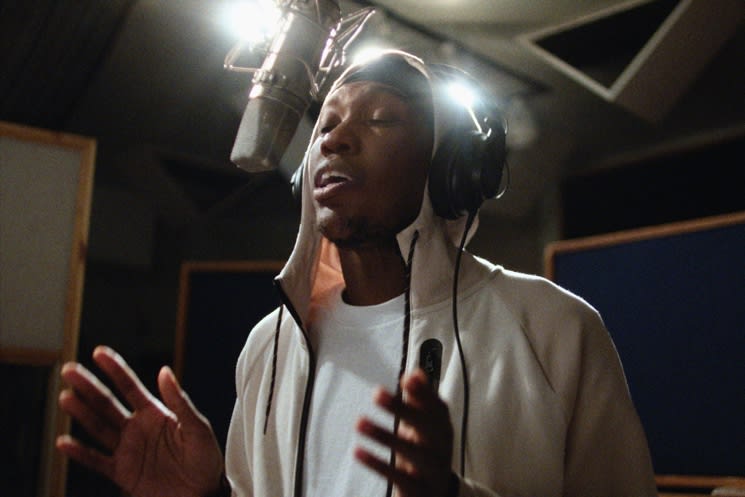Last November, a judge ruled that Young Thug's lyrics could be admitted into evidence as part of the rapper's ongoing RICO case, and, although this decision drew sharp criticism, it's not the first instance of rap lyrics being used in a trial, and undoubtedly won't be the last. Exploring the historical weaponization of Black art, particularly rap and hip-hop, by the legal system in the U.S. and abroad, J.M. Harper's As We Speak sheds some light on Young Thug's case and the greater problem at hand.
Harper employs a travelogue-type structure to the film with Bronx rapper Kemba as our host armed with questions and a curiosity to understand the how and why — and, almost more importantly, what he as a relatively new artist on the scene can do to protect himself from his lyrics. Kemba travels to New Orleans, Atlanta and even London, UK, to speak with artists like Killer Mike and Glasses Malone, as well as lawyers and academics, to contextualize this practice and gain a multidimensional understanding.
Mac Phipps, a rapper signed with No Limit Records and member of the 504 Boyz along with Master P, Silkk the Shocker and C-Murder, features prominently in the film in light of his release from prison in 2021 after serving 20 years for manslaughter. During Phipps's trial, prosecutors presented the rapper's lyrics in songs such as "Murda, Murda, Kill, Kill" to characterize Phipps as a violent individual. (According to a Huffington Post review of the case, assistant district attorney Bruce Dearing said to jurors during his closing argument. "This defendant who did this is the same defendant whose message is, 'Murder murder, kill, kill, you fuck with me you get a bullet in your brain.' You don't have to be a genius to figure out that one plus one equals two.")
Although Harper uses examples like Phipps and Young Thug, the director carefully avoids drawing any judgment about their cases; rather, As We Speak focuses its lens strictly on the unjust dangers associated with allowing lyrics into the court room. In doing so, Harper presents a thesis that applies to art across form and race that, when viewed through America's particular history on race, carries a different weight.
For a topic this charged and relevant, As We Speak oddly lacks a tangible element that could elevate the documentary from eye-opening to protest-inducing. As a newer artist, Kemba makes sense as the audience's vessel for the subject, but it's Phipps's story that brings to light the reality of what is at stake. As one of a few narratives, Phipps doesn't necessarily get lost in the film, but the impact of his injustice can feel fleeting as we move onto the next.
Ultimately, As We Speak brings those of us privileged enough to be on the outside into the middle of an ongoing conversation around artistic freedom and the judicial balance. It's not a film that sends a gut-punch; however, As We Speak touches on the importance of due process and the many instances when this legal pillar has been intentionally ignored.




